Key takeaways
- Portland’s writing community fosters a supportive environment that encourages creative growth through meaningful connections and feedback.
- Organizations like Sassafras Literary Exchange offer personalized feedback that deeply engages writers, enhancing their work and confidence.
- The community emphasizes the importance of collaboration, turning critiques into constructive dialogues that inspire writers to explore their creativity.
- Applying feedback from peers helps writers rethink their narratives, leading to clearer voices and more confident storytelling.
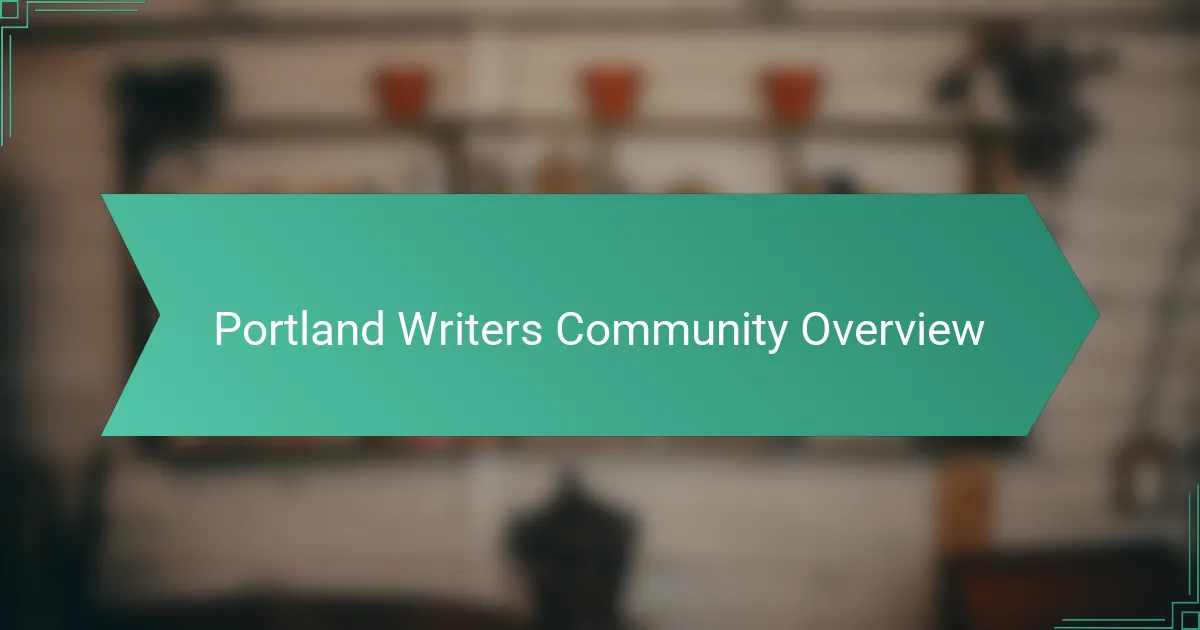
Portland writers community overview
Portland’s writing community feels like a close-knit family, vibrant and supportive. I remember the first time I shared my work at a local meetup; the genuine enthusiasm and thoughtful critiques surprised me. Have you ever wondered what it means to belong somewhere creatively? Here, it means being seen and heard by people who truly understand your craft.
The energy in Portland’s literary scene is infectious. Writers come from all walks of life, bringing stories that reflect the city’s diverse spirit. Sometimes, the best insights don’t come from formal workshops but from casual coffee shop conversations where ideas flow as freely as the espresso.
What stands out to me about this community is its commitment to growth and connection. There’s a shared hunger to improve while uplifting one another, which creates an environment where feedback feels like a gift, not a judgment. It’s this unique blend of encouragement and honesty that keeps me engaged and eager to return.
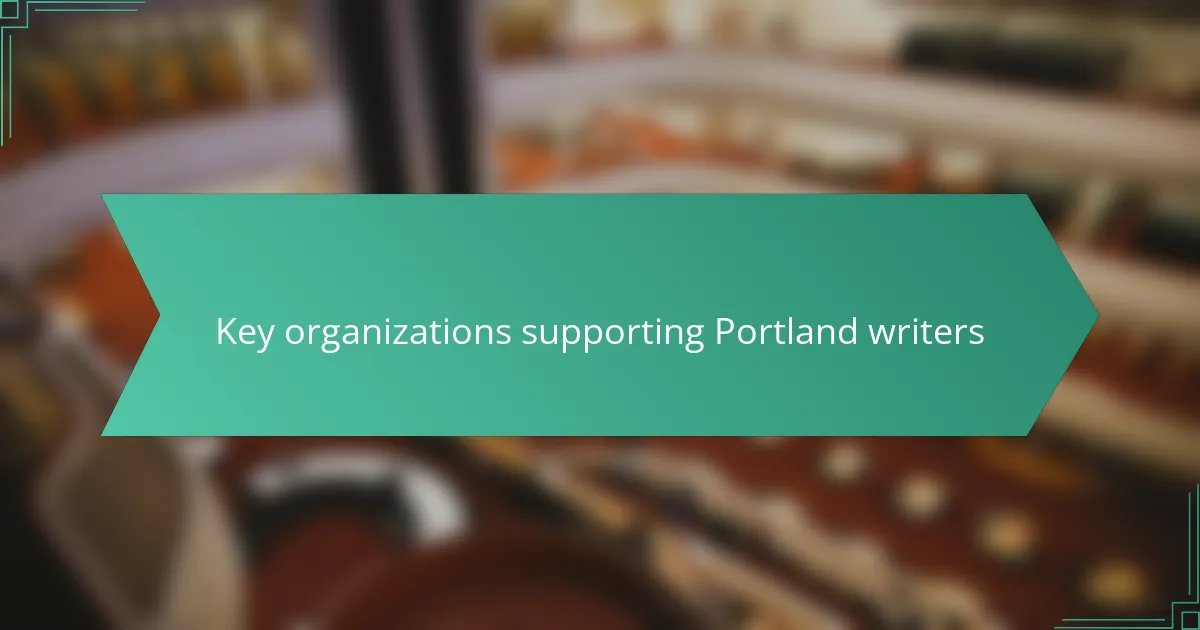
Key organizations supporting Portland writers
When I first discovered key organizations like the Sassafras Literary Exchange, I realized how vital they are in weaving the fabric of Portland’s writing community. These groups don’t just offer resources; they create spaces where voices, including mine, are welcomed and nurtured. Have you ever felt the difference between writing alone and writing within a circle that genuinely cares about your growth?
One organization I’ve found invaluable is the Literary Arts organization, which hosts readings, workshops, and festivals that make you feel part of something bigger. Their events sparked connections that went beyond the page, turning strangers into collaborators and friends. It’s more than just programming; it’s about fostering an ongoing dialogue among Portland’s writers.
Then there’s the Portland Writers Club, which offers not only critique opportunities but also mentorship that feels personal rather than procedural. When I sent my work to their critique sessions, I wasn’t just handed notes—I received insights that challenged and encouraged me simultaneously. Isn’t that what every writer hopes for? To be pushed and supported in equal measure?
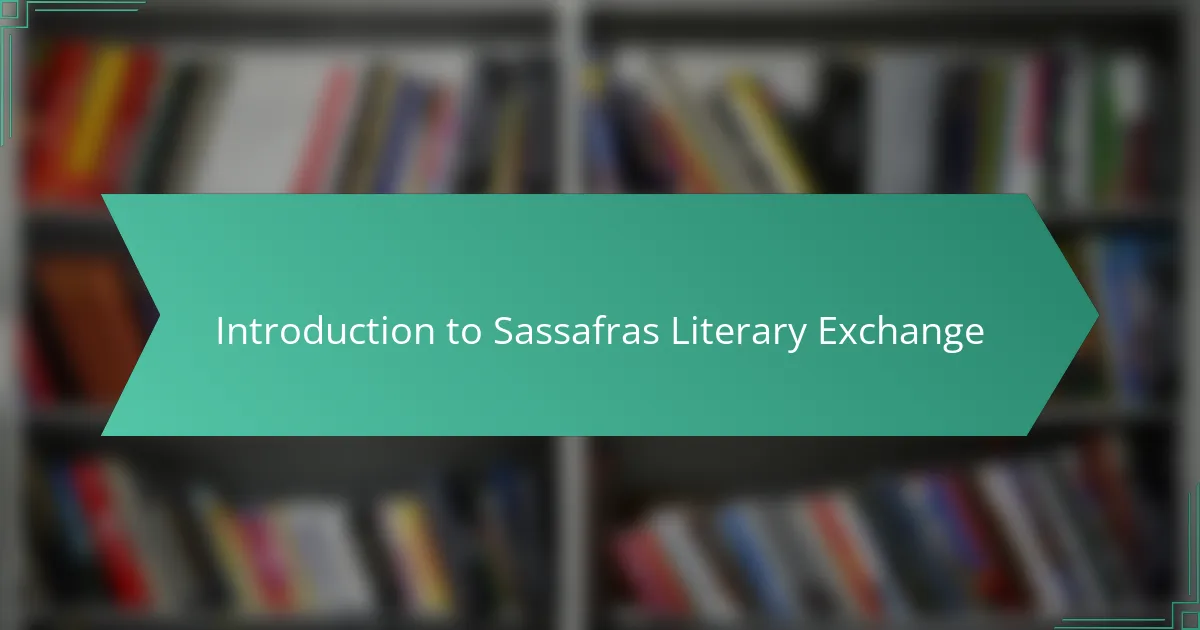
Introduction to Sassafras Literary Exchange
I first came across the Sassafras Literary Exchange during a search for more intimate, hands-on feedback opportunities within Portland’s literary scene. What struck me immediately was how the Exchange feels less like a formal organization and more like a gathering of kindred spirits, all passionate about shaping each other’s work with care. Have you ever experienced a space where your writing isn’t just read, but truly listened to?
The Exchange operates as a dynamic platform for writers to submit their pieces and receive insightful, thoughtful critiques from fellow poets and prose writers who really understand the craft. From my experience, this isn’t about surface-level comments; it’s about engaging deeply with text, often uncovering layers I hadn’t even realized were there. It made me reflect on how valuable genuine, writer-driven feedback can be in nurturing creative growth.
What I appreciate most about Sassafras is its community-driven spirit—it’s run by writers, for writers. I remember when I first got my feedback back, it felt like getting a handwritten letter from someone who had taken the time to walk inside my creative process with me. That kind of attention transformed how I approach revisions and how I view constructive criticism altogether. Have you ever felt that a critique not only improved your work but also inspired you to keep writing?
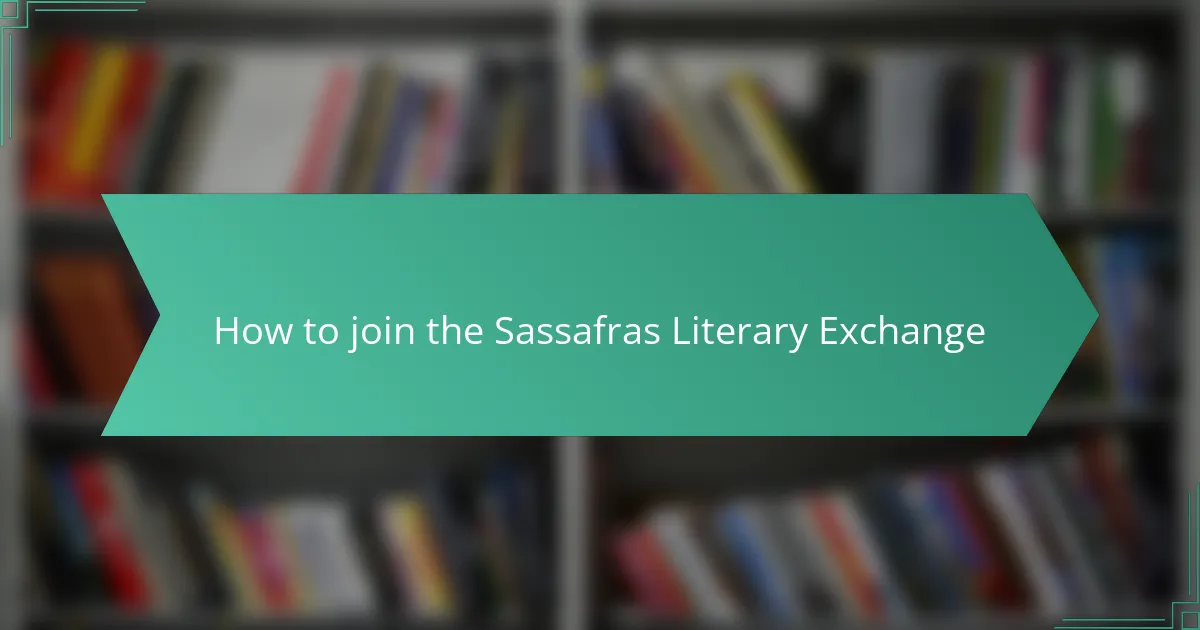
How to join the Sassafras Literary Exchange
Joining the Sassafras Literary Exchange felt surprisingly simple when I first looked into it, yet it opened a door to a deeper level of connection. You just need to visit their website, create an account, and submit your work according to their guidelines—no daunting hoops, just a straightforward invitation to share. Have you ever hesitated because a process seems complicated, only to find it was easier than you thought?
What really stood out to me was how welcoming the whole process felt. After submission, your work is paired with fellow writers who provide detailed, thoughtful feedback—a reflection of the Exchange’s commitment to genuine creative exchange. It’s not just about getting notes; it’s about entering a conversation with writers who care as much as you do.
If you’re wondering about ongoing involvement, Sassafras offers regular cycles for submissions, so you can participate as often as your schedule allows. Over time, I realized joining wasn’t just a one-off; it’s becoming part of a supportive writing rhythm that keeps me motivated. Have you found that kind of consistent community support before? Joining Sassafras might just be the creative boost you need.
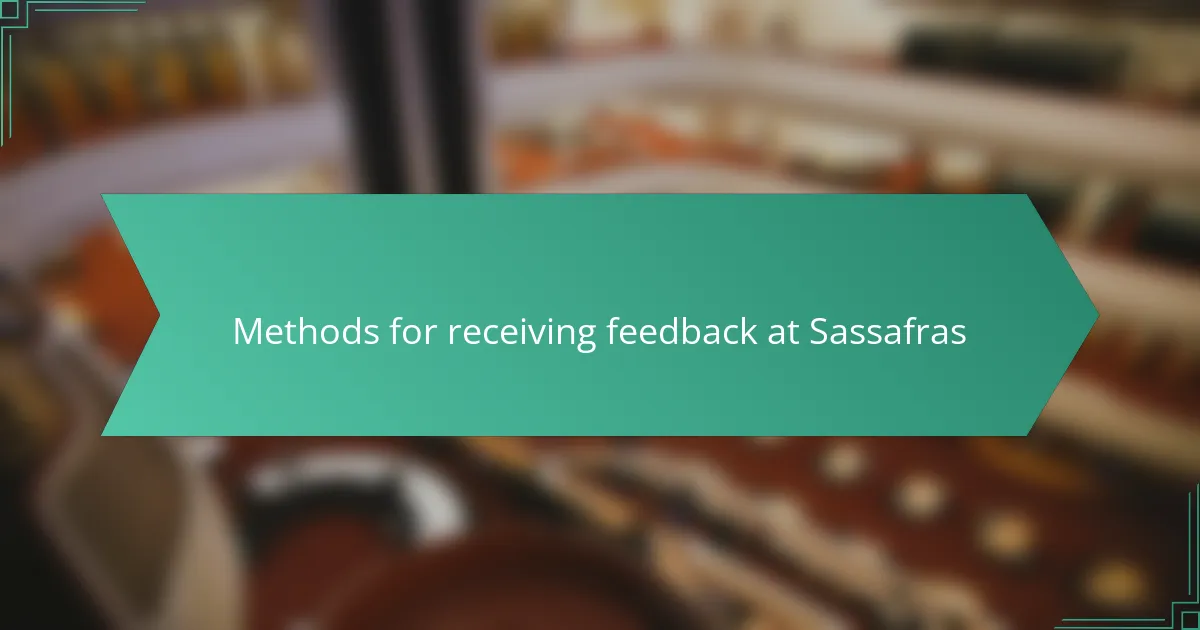
Methods for receiving feedback at Sassafras
One method that truly resonated with me was the paired critique system Sassafras uses. After submitting my piece, it was matched with another writer whose perspective offered fresh, incisive observations. Have you ever received feedback that felt simultaneously surprising and enlightening? That’s exactly what happened to me, turning my initial draft into something far more nuanced.
Another approach that stands out is the written commentary style. Instead of brief notes, I got detailed, line-by-line responses that felt more like a personal letter than a checklist. This made me feel that my work was being cared for thoughtfully, which, from my experience, is rare in feedback sessions. It’s this depth that encouraged me to dig deeper and refine my voice.
What I also found valuable were the optional follow-up conversations with reviewers. After digesting their comments, I had the chance to ask questions and clarify intentions, which turned the feedback into a genuine dialogue. Don’t you think that kind of exchange helps bridge the gap between what you meant to say and how it’s received? For me, it made revision not just a task, but a meaningful collaboration.
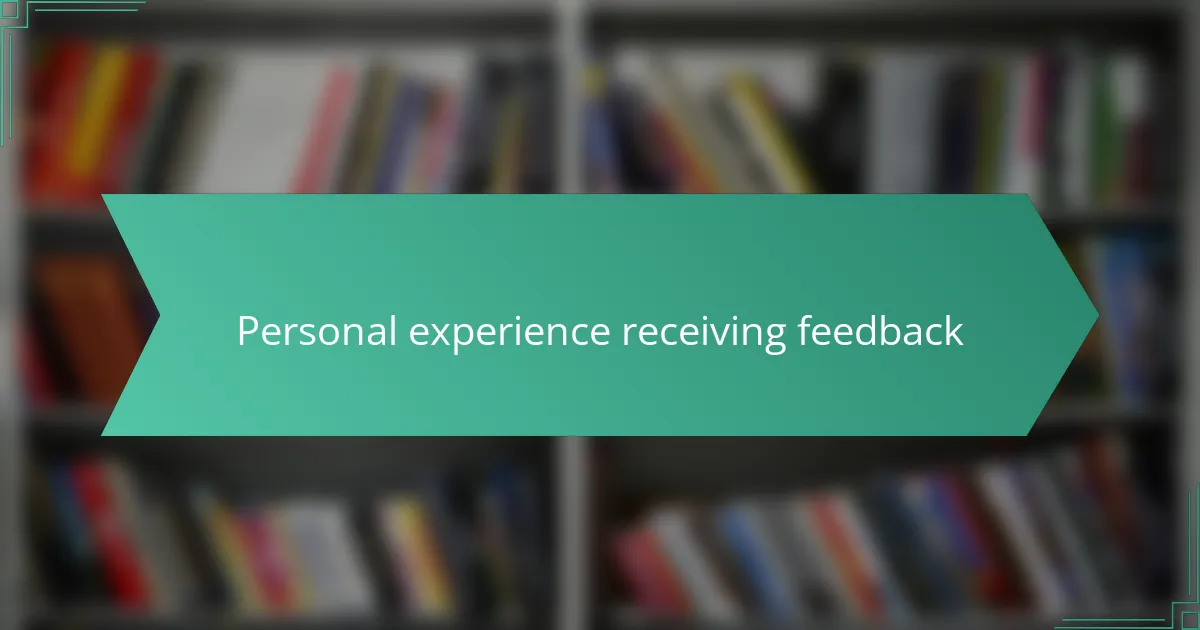
Personal experience receiving feedback
Receiving feedback from the Sassafras Literary Exchange felt like opening a door to honest and heartfelt conversation about my writing. I remember feeling a mix of excitement and vulnerability, wondering how others would perceive the parts of my work closest to my heart. Have you ever felt that nervous anticipation before sharing something deeply personal? That’s exactly what made the feedback so impactful—it wasn’t just about critique; it was about connection.
What struck me most was the kindness woven through every comment. The reviewers didn’t just point out flaws; they highlighted strengths I hadn’t noticed and gently guided me toward clarity. I found myself eager to sit with their words, letting their insights simmer rather than rushing to fix everything at once. It’s rare to experience feedback that feels more like encouragement than correction, isn’t it?
One moment that stayed with me was reading a particularly detailed note that unearthed a subtle theme I hadn’t fully realized I was exploring. It felt like a discovery made together, a shared journey between my words and their perception. That experience renewed my confidence and motivated me to trust the revision process in a whole new way. How often do you find feedback that not only improves your work but also deepens your love for writing itself?
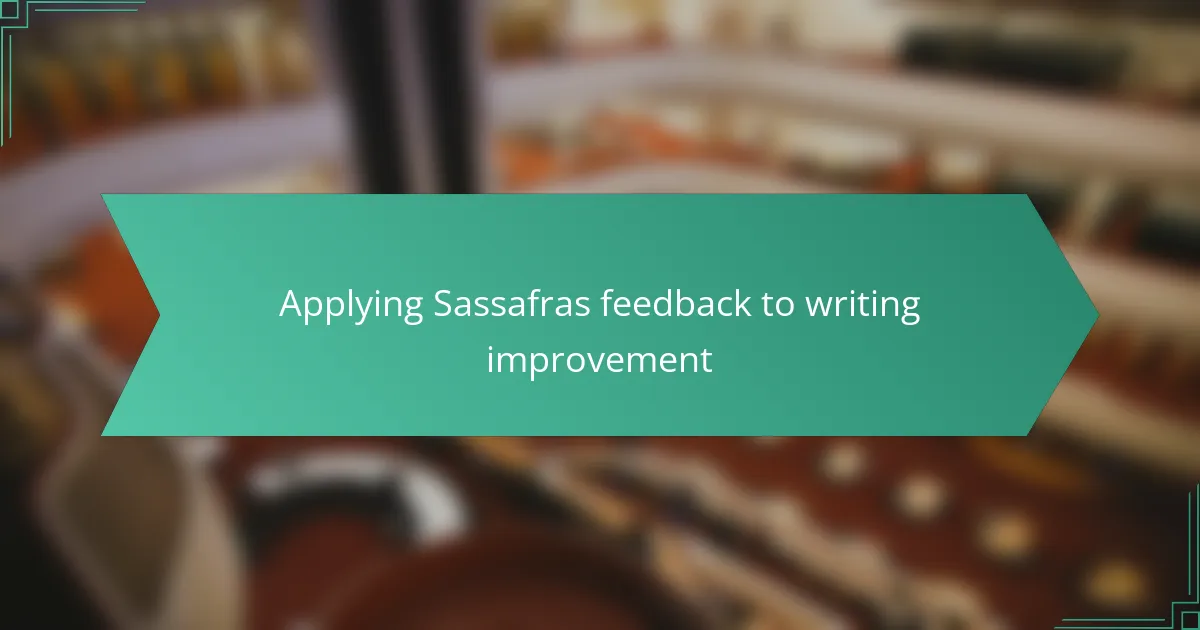
Applying Sassafras feedback to writing improvement
Applying the Sassafras feedback meant more than just tweaking sentences for me; it became an invitation to rethink how I approach my whole story. After receiving such thoughtful notes, I found myself revisiting scenes I’d almost overlooked, asking new questions about character motivation and pacing. Have you ever looked at your work through someone else’s eyes and discovered layers you didn’t know existed? That was exactly the kind of insight Sassafras helped me uncover.
What really shifted my writing was the encouragement to embrace revision as a form of discovery rather than correction. When I paused to consider the detailed comments and not just fix errors, I noticed my voice growing clearer and more confident. It made me realize that improvement isn’t about perfection but about deepening the connection between what I want to say and how my readers experience it. Have you noticed how a single line of feedback can unlock a whole new direction in your work?
I also appreciated how Sassafras feedback pushed me to experiment more freely without fear of judgment. Knowing that the critiques came from fellow writers who understand the struggle gave me the courage to take risks, whether in form or content. Those risks, in turn, opened doors to unexpected creativity. Isn’t it powerful when feedback doesn’t just guide but inspires you to explore beyond your comfort zone? For me, that’s where the real growth happens.